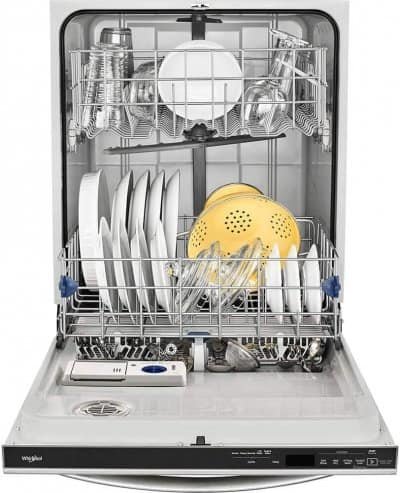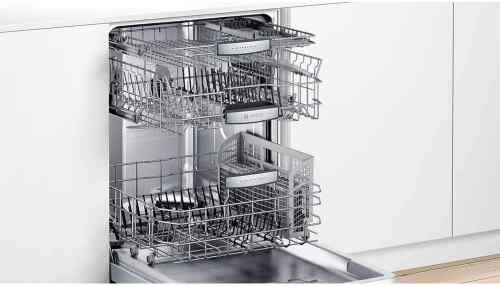In today’s modern households, dishwashers have become an indispensable appliance, saving us time and effort when it comes to cleaning dirty dishes. One common question that arises is whether dishwashers heat their own water or if they rely on the hot water supply from the household. In this article, we will explore the heating mechanism in dishwashers and uncover how they ensure optimal cleaning performance.
Table of Contents
How Dishwashers Work?
Before diving into the heating aspect, it’s important to understand the basic functioning of a dishwasher. Dishwashers are designed to automate the process of cleaning dishes, utensils, and other kitchenware. They consist of a main washing compartment, spray arms, detergent dispenser, water inlet, and a drain.
Once the dishwasher is loaded with dirty dishes and the appropriate detergent is added, the washing cycle begins. Water is initially supplied to the dishwasher through the water inlet. The spray arms, powered by a pump, distribute the water evenly throughout the dishwasher. The combination of water pressure and detergent helps remove food particles and stains from the dishes.
Heating Mechanism in Dishwashers
To ensure effective cleaning, dishwashers often require hot water. The heating mechanism in dishwashers plays a crucial role in achieving the desired cleaning performance. While some dishwashers rely on the hot water supply from the household, many models come equipped with their own water heating system.
Heating Methods in Dishwashers
Dishwashers employ various methods to heat the water internally. One common approach is the use of an electric heating element. This heating element is typically located at the bottom of the dishwasher’s tub. When the washing cycle begins, the heating element activates and gradually heats the water to the desired temperature.
Another heating method employed by dishwashers is the use of a built-in water heater. These dishwashers have their own heating unit that directly heats the water to the required temperature. This ensures consistent hot water availability throughout the cleaning cycle.
Benefits of Heating Water in Dishwashers
Heating water in dishwashers offers several benefits that contribute to their overall efficiency and cleaning performance. Let’s explore some of these advantages:
Energy Efficiency
Dishwashers with built-in water heaters allow for precise control over the water temperature. By heating the water internally, they eliminate the need to rely solely on the household’s hot water supply. This can lead to energy savings, as the dishwasher can heat the water more efficiently and minimize heat loss during transportation through the plumbing system.
Cleaning Performance
Hot water plays a crucial role in dissolving grease, food residues, and stubborn stains. By heating the water to an optimal temperature, dishwashers ensure thorough cleaning of dishes, resulting in sparkling and sanitized results. The combination of hot water, detergent, and proper water pressure maximizes the dishwasher’s cleaning effectiveness.
Sanitization
Heated water can aid in the sanitization process by killing bacteria and germs present on dishes. Dishwashers with built-in water heaters can reach higher temperatures that are necessary for effective sanitization, ensuring that your dishes are not only clean but also free from harmful microorganisms.
Types of Dishwashers with Built-in Water Heaters
There are different types of dishwashers available on the market, and some specifically feature built-in water heaters. Let’s take a look at the most common types:
1. Standard Built-in Dishwashers
Standard built-in dishwashers are the traditional models that are permanently installed under the kitchen counter. Many of these models come equipped with their own water heating systems, allowing for efficient cleaning and sanitization.
2. Compact Built-in Dishwashers
Compact built-in dishwashers are designed for kitchens with limited space or for smaller households. Despite their smaller size, these dishwashers often include a built-in water heater, providing the same benefits as their standard counterparts.
3. Portable Dishwashers
Portable dishwashers offer the flexibility to be moved around the kitchen as needed. These models usually come with wheels for easy transportation. Some portable dishwashers also feature built-in water heaters, ensuring hot water availability wherever they are placed.

Factors to Consider When Buying a Dishwasher with a Built-in Water Heater
When considering a dishwasher with a built-in water heater, there are a few factors to keep in mind:
- Capacity: Determine the appropriate size and capacity based on your household’s needs. Consider the number of place settings the dishwasher can accommodate.
- Energy Efficiency: Look for energy-efficient models that can help reduce utility costs in the long run. Energy Star-certified dishwashers are a good indicator of energy efficiency.
- Washing Programs: Check for a variety of washing programs and settings that cater to different types of dishes and cleaning requirements.
- Noise Level: Consider the noise level of the dishwasher, especially if your kitchen is open to the living or dining area. Look for models with noise reduction features.
- Additional Features: Explore additional features such as delay start, adjustable racks, soil sensors, and water filtration systems to enhance your dishwasher’s functionality.
Do dishwashers heat water?
Yes, dishwashers do heat water. The heating element inside the dishwasher heats up the water to a temperature of between 140-150 degrees Fahrenheit. This hot water is then used to clean and sanitize your dishes.
The amount of energy used to heat up the water can vary depending on the size and type of dishwasher you have. Some models may require more energy than others, while some may be more efficient when it comes to heating up the water. Additionally, certain settings on your dishwasher will also affect how much energy is used for heating the water. For example, if you choose a higher temperature setting, it will use more energy to heat up the water than if you choose a lower temperature setting.
In conclusion, dishwashers do heat up water in order to clean and sanitize dishes. The amount of energy used for this process will depend on the type and size of your dishwasher as well as any settings you choose for it.
Do dishwashers heat their own water?
Yes, dishwashers do heat their own water. The water is heated by an electric heating element located at the bottom of the dishwasher. This element is connected to the hot water line and warms the water as it enters the dishwasher. The temperature of the water is usually between 120-140 degrees Fahrenheit, depending on your dishwasher’s settings.
The amount of hot water used in a cycle depends on how dirty your dishes are and what type of cycle you have selected. For instance, a heavy-duty cycle will use more hot water than a light-duty cycle. Additionally, if you have hard water or lots of food residue on your dishes, you may need to run an extra rinse cycle to ensure that all of the dishes are thoroughly cleaned.
Overall, having a dishwasher with its own heating element makes cleaning dishes much easier and more efficient than handwashing them in cold or lukewarm water.
Can I connect my dishwasher to the hot water supply in my home?
Yes, many dishwashers provide the option to connect to the hot water supply. However, using the dishwasher’s built-in water heater can offer more precise temperature control and energy efficiency.
What is the recommended water temperature for optimal cleaning in a dishwasher?
The recommended water temperature for dishwashers is generally around 120 to 140 degrees Fahrenheit (49 to 60 degrees Celsius) for effective cleaning and sanitization.
Do all dishwashers with built-in water heaters have the same heating capacity?
No, the heating capacity can vary depending on the model and brand. It’s important to check the specifications of the dishwasher to ensure it meets your requirements.
Are dishwashers with built-in water heaters more expensive than those without?
Dishwashers with built-in water heaters may have a slightly higher initial cost compared to those without. However, the energy savings and improved cleaning performance they offer can outweigh the initial investment in the long run.
Can I use my dishwasher without heating the water?
Yes, you can use a dishwasher without heating the water. However it is recommended to use hot water for optimal cleaning results. Hot water helps to dissolve grease and stubborn food particles more effectively, leading to cleaner and sanitized dishes. Using the dishwasher’s built-in water heater ensures consistent hot water throughout the washing cycle, enhancing the cleaning performance.
Conclusion
Dishwashers with built-in water heaters are designed to provide hot water for optimal cleaning and sanitization. These appliances offer energy efficiency, improved cleaning performance, and the convenience of consistent hot water throughout the washing cycle. When purchasing a dishwasher with a built-in water heater, consider factors such as capacity, energy efficiency, washing programs, noise level, and additional features to find the best fit for your needs.


Pingback: Is It Cheaper to Use a Dishwasher or Wash by Hand 2023